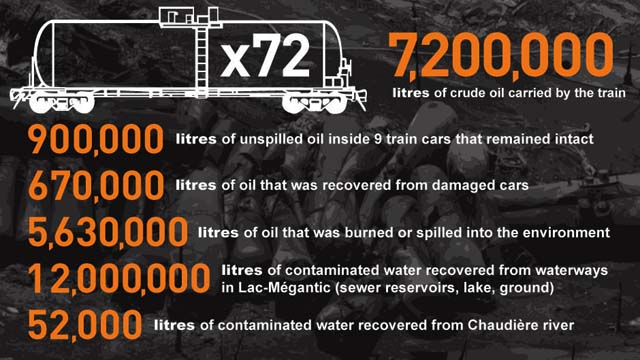
But Where's the Inquiry?
Ottawa Ontario - In popular culture, different types of crises and disasters generate different types of narratives about accountability.
Natural disasters such as Hurricane Harvey and the B.C. wildfires tend to generate heroic accounts of emergency services, little is said about the town planners that exposed communities to such devastating natural dangers in the first place.
Acts of God are understood to be no one's fault.
Industrial failures, in contrast, typically generate a ruthless and narrow hunt for accountability.
The impulse is misleading, as we learn in the inquiries that follow, industrial systems exist in a complex technological and organizational context that prevents us from so easily finding one smoking gun.
This month the trial is set to begin in Quebec of Thomas Harding, the Montreal Maine & Atlantic Railway (MMA) train engineer whose unattended train derailed in Lake Megantic on 6 Jul 2013 killing 47, prompting the evacuation of 2,000, and decimating the downtown area.
The tone for the Lake Megantic trial was set 10 months after the tragedy, when Mr. Harding was surrounded at his home by a SWAT team and led away in handcuffs to face charges of criminal negligence causing death, despite the fact that his lawyer had notified the police that Mr. Harding would voluntarily come to the court when asked to appear to face charges.
He was escorted to a makeshift courtroom in full view of the news media.
Despite the focus on Mr. Harding, there is plenty of blame to go around.
In the Auditor-General's fall of 2013 report, which examined Transport Canada's (TC) safety oversight of rail, he noted a number of long-standing and important safety issues, including poor implementation and oversight of safety-management systems.
In its report on the incident, published three months after Mr. Harding appeared in court, the Transportation Safety Board (TSB) identified 18 distinct causes and contributing factors for the disaster, three of which it attributed to the regulator, TC.
These reports coupled with the public focus on Mr. Harding raise important questions about how we hold people to account for these failures and whether these processes will instill confidence in the public that these industrial systems are safe.
While the TSB concluded "the tragedy in Lake Megantic was not caused by one single person, action, or organization," many who share responsibility are not exposed to the same level or type of scrutiny as the train engineer, Mr. Harding.
Despite the initial media coverage of MMA chief executive officer Edward Burkhardt, he has never appeared in court over the matter.
The company filed for bankruptcy protection and has since been sold.
Others have also avoided a similar degree of public scrutiny.
In a lawsuit, 25 companies were accused of sharing responsibility for the derailment and they contributed approximately $450 million to an out-of-court settlement fund for the victims.
When asked in 2015 by the CBC whether any public servants lost their jobs because of the events in Lake Megantic, then-federal transport minister Lisa Raitt obfuscated, "If you take a look at the current listing of people who are in TC you'll see there's a marked difference than the people who were in TC pre-2013. A lot of it was natural turnover, there was a lot of retirements happening, and you know the management of the department lies with the deputy minister."
A change in government did not bring greater clarity.
TC was one of the contributors to the settlement fund but did not disclose how much it contributed.
The new Minister of Transport, Marc Garneau, would simply say, "We don't acknowledge that we had any responsibility, however, we did want to make a contribution because of the impact of this terrible tragedy in Lake Megantic."
Whether benign neglect or criminal failure, the trial this fall may well reveal poor operational practices at MMA.
There will also be claims that Mr. Harding is a scapegoat, standing in the docket to protect government and industry elites or a competitive market context that cuts costs at the expense of safety.
The accountability and audit processes that have followed the train derailment underscore that our public institutions also shape the manner in which we hold people to account.
The absence of an inquiry into the incentives, actions, and governance of the industry underscores how our public institutions can expose some and shield others in the aftermath of a disaster.
To instill confidence in the industry and the regulator, the government should have called an inquiry.
Kevin Quigley.
of the Canadian Copyright Modernization Act.


